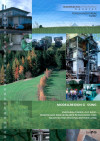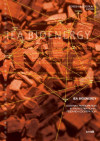Suchergebnisse
Berichte aus Energie- und Umweltforschung 4/1997 Stirling-Heizkraftwerk Phase II

Entwicklung eines mit Holz betriebenen Stirling-Kleinkraftwerkes zur dezentralen Strom- und Wärmeerzeugung - Phase II
Berichte aus Energie- und Umweltforschung 12/2003 Bioenergie und Gesamtwirtschaft

Analyse der volkswirtschaftlichen Bedeutung der energetischen Nutzung von Biomasse für Heizzwecke und Entwicklung von effizienten Förderstrategien für Österreich
Presentation of the effective use of innovative bioenergy technologies in the Austrian energy system of the future (BioEff)
The study shows possibilities and strategies for the effective use of innovative bioenergy technologies in Austria.
Energie - Forschung und Entwicklung
Ausgaben der Öffentlichen Hand in Österreich, Erhebung 2006
Energieforschungserhebung 2013: Ausgaben der öffentlichen Hand in Österreich, Erhebung für die IEA

Die Mitgliedschaft Österreichs bei der Internationalen Energieagentur (IEA) verpflichtet Österreich zur jährlichen Erfassung aller öffentlich geförderten F&E-Projekte. Die Energieforschungserhebung ist ein wichtiges Instrument, um Entwicklungen im Bereich der Energietechnologien zu verfolgen und entsprechende FTI-politische Maßnahmen zu setzen.
Mehrsprachig
Berichte aus Energie- und Umweltforschung 3/2002 Beschäftigung und Erneuerbare Energieträger

Erarbeitung eines methodischen Leitfadens zur Abschätzung der Beschäftigungseffekte im Bereich der erneuerbaren Energieträger
Modellregion Güssing

Energieautarkie auf Basis regionaler erneuerbarer Ressourcen und nachhaltige Regionalentwicklung
Forschungsforum
1/2007
Herausgeber: BMVIT
Deutsch, 6 Seiten
Downloads zur Publikation
Multifunktionale Energieversorgung in Städten
Technologieportfolio und Aktionsplan für die Integration nachhaltiger Energieträger in der Fernwärmeproduktion von Städten und zur Steigerung der Gesamteffizienz der Fernwärmeversorgung vom Energieeinsatz bis zur Energiedienstleistung.
Fair market conditions for virtual power plants
Analysis of technical, economical and regulatory conditions to get fair terms under competition in the liberalised market for virtual power plants on renewable energy basis.
Technologie Portrait Feste Biomasse (August 2000)

Das Technologie Portrait bietet einem Fachpublikum ebenso wie der interessierten Öffentlichkeit ein kompaktes Querschnittsbild des Technologiebereiches Feste Biomasse.
Virtual power plants for self-sustaining regions
Geographic methods for the combination of renewable energy sources to create "virtual power plants" and development of self-sustaining regions in terms of energy-balance and the Kyoto target.
Energieforschungserhebung 2010

Energie - Forschung und Entwicklung: Ausgaben der öffentlichen Hand in Österreich 2010
Energieforschungserhebung 2005

Ausgaben der öffentlichen Hand in Österreich - Erhebung für die IEA
IEA Bioenergy

Austrian Participation in an international Research Cooperation
Forschungsforum
4/2000
Herausgeber: BMVIT
Englisch, 6 Seiten
Downloads zur Publikation
Energieforschungserhebung 2007

Ausgaben der öffentlichen Hand in Österreich Erhebung für die IEA
Technology and Innovation Roadmap "BioHeating and Cooling"

The Roadmap links with the energy research strategy of the Austrian Council for Research. It was developped together with national stakeholders from industry to deduct recommendations for policy makers. It includes clear suggestions for research topics until 2020 and provides an outlook on the contribution of biomass to the heating sector of a decarbonised energy system in 2050.
Wirtschaftlichkeits- und CO2-Bewertung ausgewählter biomassebasierter Energieträger für Österreich (BIOWERT)
Beitrag zur Dekarbonisierung 2040
Agriculture 2020
Agriculture will become an important supplier of sustainable energy services for society. However, this sector can only fulfil this role if it operates on the base of sustainable energy provision itself. The project will determine the necessary measures to achieve this state for a concrete regional setting (eastern Styria) by the year 2020.
Berichte aus Energie- und Umweltforschung 1/2002 Premium - Hackgut

Produktionstechnische Voraussetzungen für die Herstellung hochwertiger Holzbrennstoffe
Solarunterstützte Wärmenetze

Zweigeteiltes Projekt: Biomasse-Nahwärmenetze mit Solaranlagen, Untersuchung der ökonomischen und ökologischen Sinnhaftigkeit der Koppelung von zwei CO2-neutralen Energieträgern; Solaranlagen für Mehrfamilienhäuser, Erstellung von standardisierten Systemkonzepten und Planungsrichtlinien.
